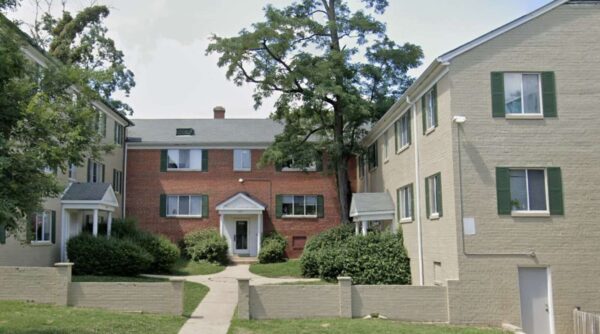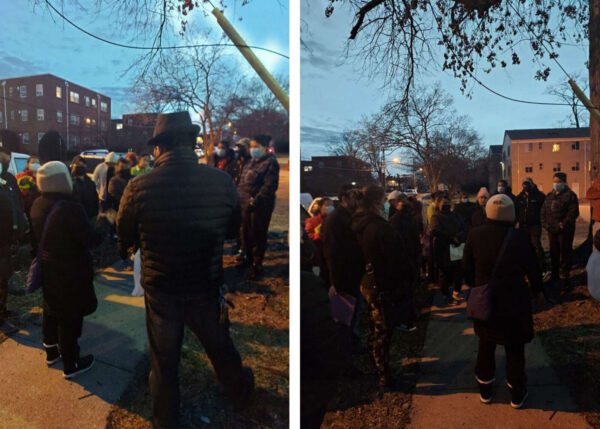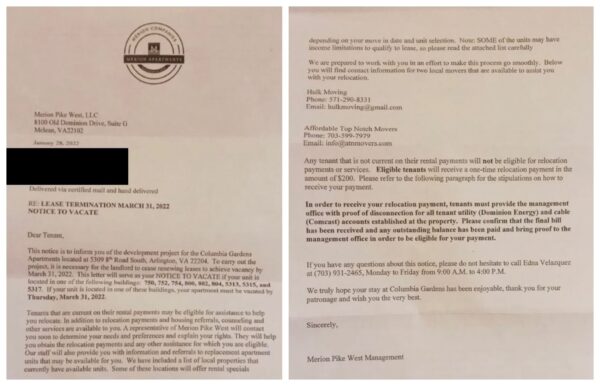
(Updated 10:45 a.m.) Nearly 60 residents and families on Columbia Pike are scrambling to find new housing options under the shadow of a looming redevelopment project.
The impacted tenants live at Columbia Gardens Apartments (5309 8th Road S.), a collection of market-rate affordable garden apartments. Some families have lived there for upward of 20 years, but now, 62 units will be replaced with townhouses through a by-right development project.
Residents have about 50 days to find new homes. Last weekend, they received letters via certified mail giving them until March 31 to vacate, listing nearby complexes with openings and local movers, and offering $200 in rental assistance. The complex owner had transitioned them to month-to-month leases before giving them the notice, which would have been 120 days by law if they had renewed for a year.
“Everybody’s stressed,” says tenant Maria Torres, 31, who has a daughter at Campbell Elementary School. “They want to stay in the same area because they want their kids to stay in the same schools. We’re in the middle of the pandemic and the school year, and some people don’t have the money to just go and give a deposit and a month of rent.”
Tenants knew eventually the apartments would be torn down, since the property owner is also redeveloping the property it owns nearby at 843 S. Greenbrier Street, a separate project that received County Board approval in November 2020. But, she says, management didn’t indicate when notice would come for them.
“We thought they were going to give us time,” says Torres, a 15-year Pike resident. “We didn’t imagine it’d be only 45 days.”
Now, the 58 households will be competing for affordable housing in Arlington, which is grappling with a shortage of options as well as habitability concerns, such as rodents and mold, at some complexes with units set aside for low-income residents. This bottleneck could drive longtime residents out of the county, tenant advocates say.
“We have a shortage of affordable apartments,” said Elder Julio Basurto, a community leader working with the tenants. “Where are they going to go?”

Advocates and some local elected officials say the notice is unjust and poorly timed, and are trying to buy tenants more time to resettle. Long term, they aim to reform the state housing codes to require longer notice periods for month-to-month renters and enact local policies to support low- and moderate-income communities at risk of displacement as the Pike redevelops.
“This is a horrible situation in the middle of winter, in the middle of a pandemic, with kids going to local schools having to potentially move out of school,” said Del. Alfonso Lopez, whose district includes most of Columbia Pike. “Everything about it is horrible, and it needs to be addressed immediately.”
Columbia Gardens’ owner, Merion Companies, says it’s doing what it can to help — but ultimately, the old buildings need to come down.
“There is no good time to [give notice],” said managing member Ryan Bensten. “We’re completely sensitive to that fact and have tried to do the right thing by our tenants to minimize heartache and impact.”
He said Merion provided a list of 13 locations where the group found vacancies and are trying to place some families in other units on the Columbia Gardens property not yet slated for development. He has three staff members dedicated to answering calls and working with tenants.
“These buildings have lived beyond their useful life,” Bensten said. “We’re moving on with a redevelopment — the project is complex with a lot of moving parts and we’re doing our best to be responsible to our tenants as we can.”
On short notice
At the core of this saga is a frustration with Virginia code, which requires landlords to provide 30 days of notice to tenants on month-to-month leases in the event of a renovation project, as opposed to 120 days of notice for year-long leases.
It’s a provision that dates back at least to 2005, says Lopez, but was most recently clarified in 2015 as part of a law providing protections to residents of mobile homes.
Merion acquired the property around four years ago, and as tenants’ year-long leases expired, they transitioned to month-to-month arrangements, Bensten says.
“Typically, in Virginia, the month-to-month lease automatically kicks in once your lease has expired and if the landlord doesn’t make an attempt to renew the normal lease,” says Kellen MacBeth, who chairs the Arlington branch of the NAACP’s Housing Committee and is Vice-Chair of the Arlington Housing Commission.
Both tenants and landlords can terminate a month-to-month lease with 30 days of notice, which is convenient for landlords and can sometimes benefit tenants, he said.
“But in the case where the tenant has a family and has established themselves in this neighborhood — this is their home and they’re not looking to make major changes — it can be really challenging, as we see here,” MacBeth said. “Thirty days is not a lot of time to pack up your family and move.”
That residents technically have 50 days from Feb. 11, when the certified letters went out, doesn’t help much, according to advocate Janeth Valenzuela, who says she has taken non-stop calls from desperate and distraught residents who also are reporting problems reaching Columbia Gardens’ office staff.
“Counting from Saturday, it’s more than a month, but what are you going to do in that time? Nobody will get back to you in a month or a month and a half,” she said.

Limited ways to help
The county, Arlington-based affordable housing developers and local organizations are also pitching in.
“County staff has been in contact with the owner and resident advocates to discuss this situation and offer whatever assistance the County can provide,” says Erika Moore, a spokeswoman with the Department of Community Planning, Housing and Development. “The County has also been in communication with other housing providers and advocates to determine what options might be available for families and is ready to offer additional assistance that may be needed by Columbia Gardens families.”
Meanwhile, AHC, Inc. and the Arlington Partnership for Affordable Housing are helping resettle families.
“We want to do everything we can now and in the months ahead to provide support and help find appropriate and affordable housing for the Columbia Gardens residents impacted by this redevelopment,” APAH spokeswoman Cheryl Ramp said.
AHC shared all vacancies in its communities and asked other landlords to do the same, interim CEO Susan Cunningham said in a statement.
“AHC will continue to do everything we can to keep Columbia Garden residents stably housed and Columbia Gardens children in consistent APS school environments,” she said.
Some of these properties, however, are part of the 1,200 units the county is inspecting for mold and rodents, prompted by the presence of infestations at AHC’s Serrano Apartments last year, Basurto and Valenzuela say.
Torres says she and others want more time and confirmation they’ll get their security deposits back.
“We know we have to move — we don’t plan to stay here forever — but we just want time,” said Torres.
Long-term reforms
Ultimately, advocates say necessary reforms won’t help Columbia Gardens residents, but changes could help future tenants in a similar position.
Lopez says he has been working with Virginia Housing and state-level housing advocates to amend legislation during this session that would give more than 30 days of advanced notice to month-to-month tenants. He says he’s also trying to figure out why the year-long leases automatically reverted to monthly arrangements.
“I know it’s too late to help the residents because the law supports the landlord, but we can do something to overturn this legislation and lobby for better protections for residents,” Valenzuela said. “It’s going to happen again.”
The story of Columbia Gardens could have played out at the Barcroft Apartments, except the county caught wind of the sale and intervened, says MacBeth. The county and Amazon loaned $150 million and $160 million, respectively, to developer Jair Lynch in order to finance the sale while preserving 1,334 units on the site for affordable housing.
“Obviously, that didn’t happen here,” MacBeth said. “I don’t think the county has anything in place to set up an early warning system to find out these things are coming down the pike… and make sure at the very least the displaced tenants have some support when they’re moving.”
He says further talks with the county could yield more incentives for property owners that preserve affordable housing during redevelopment projects.
“We’re past the point in Arlington where we accept, as advocates, ‘Our hands are tied,'” MacBeth said. “We can keep saying that, and losing our low- and moderate-income population and move to a population that’s wealthier and whiter, or we can find solutions.”

